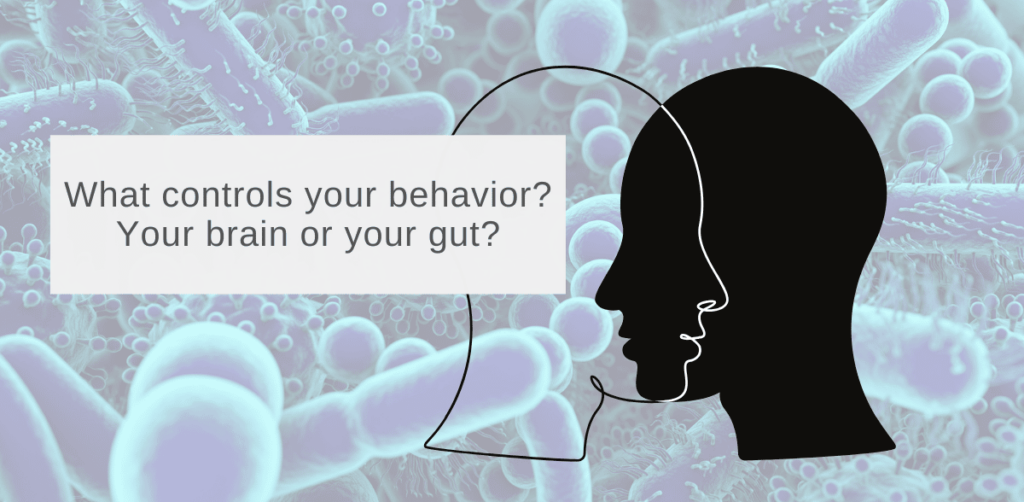Summary:
Over the past decade the microbiome has become known as an important modulator of human health, and research in the field has skyrocketed: publications have risen over 6.2x and clinical trials are up 2.9x. One of the most intriguing areas of research is looking at the link between the microbiome and behavior. While many researchers have flagged potential problems of reading too much into these studies, they are raising important questions that could have significant impacts on how we consider the human microbiome and how we treat behavioral disorders. In this article we will review recent publications that investigated the connection between microbial composition and behavior.
While we don’t often like to think of our bodies as housing other organisms, microbes such as bacteria, fungi and viruses are essential to our survival. These microbes, known collectively as the microbiome, have become a hot topic in research [Figure 1], where studies are being conducted on everything from the microbiome’s ability to ease the side effects of long-term COVID-19, to how an individual’s microbial composition is determined: from birth, to childhood environment, to diet and stress levels.

Figure 1. Growth of the Microbiome Field in Grants, Publications, Patents, and Clinical Trials.
One of the most prominent ways the microbiome affects human health is through its influence on the brain. This bi-directional communication is referred to as the gut-brain axis (GBA) — it connects the central nervous system (CNS), the autonomic nervous system (ANS), the enteric system (ENS), and the hypothalamic pituitary axis (HPA) — and makes the saying, “your stomach is your second brain” surprisingly accurate. [Figure 2] (Carabotti et L., 2015). This gut-brain communication axis works because the mediators of the CNS, ANS, ENS, and HPA (short-chain fatty acids, neurotransmitters, immune system modulators, hormones and the vagus nerve) are all influenced by microbial metabolism (Choudhury et al., 2022).

Figure 2. Microbiome gut-brain axis structure (Carabotti et L., 2015).
Notably, one study showed the prominent effects of this gut-brain connection by feeding mice a probiotic and measuring their stress levels (Bravo et al., 2011). While the addition of the probiotic significantly decreased their stress levels, when researchers severed their vagus nerve the probiotic’s de-stressing effect disappeared . In humans, the ability of stress to impact gastrointestinal health can clearly be seen in people diagnosed with IBS and Crohn’s. In fact, these gastrointestinal diseases are associated with reduced function of the vagus nerve (Pellissier et al., 2014). On a broader scale, people who don’t suffer from a gastrointestinal disorder can still commonly experience the connection between stress and gut health, often through an increase or decrease in appetite levels. Hence, people complaining of ‘emotional eating,’ or being “so nervous I can’t eat.”
Recently, research has started to investigate the other direction of the GBA signaling, asking, if stress can disrupt the gut, can the gut impact stress, emotional disorders, and personality?
Animal Studies
Most of the research that has been conducted on the bidirectional microbiota-gut-brain communication has utilized animal models, and has looked at amygdala-dependent behavioral responses (i.e. anxiety, and willingness to explore) (Valles-Colomer et al., 2019). For example, it has been found that microbial groups like Atopobium and Prevotella/Prevotellaceae are positively and negatively associated with exploratory behavior in mice and piglets (De Palma et al., 2018; Choudhury et al., 2022). Furthermore, mice that have been raised to have no microorganisms living in them, known as “germ-free mice”, show an altered transcriptional profile compared to mice raised normally (Hoban et al., 2018). In the germ-free (GF) mice there is a marked increase of immediate-early genes, and genes implicated in neural activity, synaptic transmission and nervous system development (for instance, Drd2, Adora2a, Tac1, Ngf, and Egr1, Egr2). In concurrence with the findings of the previously mentioned studies, these GF mice also showed altered fear regulation: displaying reduced memory retention of a tone-shock association task. Taken together, these findings suggest that GF mice’s baseline is a hyperactive amygdala, and consequently, their already elevated fear-state hinder their ability to process the fear-conditioning as strongly as the control mice. Thus, these studies indicate that an unbalanced microbiome may contribute to stress and anxiety disorders by fostering a more anxious, fearful response to external stimuli.
Neuropsychiatric Conditions
Neuropsychiatric disorders range greatly, but overall, they are characterized by a dysfunctional central nervous system. Over the past two decades it has been found that people suffering from a range of psychiatric diseases experience gut dysbiosis as well as gastrointestinal disorders such as IBS, celiac disease, and Crohn’s disease (Hoffman et al., 2020). For instance, people suffering from borderline personality disorder (BPD) show a difference in the composition of gut microbiota (higher Bacteroidetes/Firmicutes-ratio) as compared with healthy control participants (Rössler et al., 2022). For Post Traumatic Stress Disorder (PTSD), a unique microbiome signature (decreased levels of the bacteria sp_HMT_914, 332 and 871 and Noxia) has been observed, and how strongly a person displays this signature correlates with the severity of their PTSD symptoms (Levert-Levitt et al., 2022). While researchers like Rössler and Hoffman have noted that it is still unknown whether these patient’s distinct microbial compositions are a result of medications used to treat their disease, or the disease itself, these findings are encouraging. Knowing that psychiatric disorders often present alongside an altered microbial profile means that it might be possible to create non-invasive therapies for these conditions by specifically targeting their microbiome.
Personality
Knowing that personality is associated with mental disorders, and that unique microbial compositions are also associated with mental disorders, researchers such as Dr Han-Na Kim, Dr Katerina Johnson, and Dr Ali Boolani set out to see whether one’s personality and microbiome are linked, even in the absence of a psychiatric disorder (Kim et al., 2018; Johnson, 2020; Boolani et al., 2022). While each study examined the link differently, all researchers found a correlation between gut microbiome and personality traits. For instance, Boolani and colleagues categorized personality into the traits of mental energy (ME), mental fatigue (MF), physical energy (PE), and physical fatigue (PF), and found unique gut bacteria profiles for each (2022). The energy traits (mental and physical) were associated with bacteria that perform metabolic functions (ex. Firmicutes & Firmicutes Clostridia), whereas the fatigue traits (mental and physical) were associated with bacteria that are linked to inflammation (ex. Firmicutes Erysipelotrichi & Proteobacteria Gammaproteobacteria). Similarly, Johnson looked at people’s gut microbiome and their social behavior and found that people with larger social networks, who tended to be more sociable in those groups, had higher microbiome diversity (2020).
Potential Problems with Microbial-Behavior Research
Many researchers have pointed out the inconsistencies and unreliability of these studies, as there have been few studies conducted in humans, and so there are no established standards for these studies. Humans also have individual differences in microbial compositions which may make it difficult to determine a link between microbes and behavior in a population pool. There is also the concern that results from microbiome-personality studies oversimplify the connection between microbe presence/diversity and behavior, with the tendency to describe results as causational, rather than correlational.
Furthermore, while animal models are often utilized in microbiome research, it can be difficult to translate behavioral studies to humans, particularly depending on the animal. Thus, in order to maximize translational value, researchers should look to using models such as piglets, which have strikingly similar CNS development as compared to humans (Choudhury et al., 2022).
Conclusion
Thanks to microbiome research we are learning that the saying, ‘you are what you eat’ can extend beyond physical aspects which are commonly associated with the gut, such as high blood pressure and diabetes, to mental aspects such as fatigue, outgoingness, and anxiety. While studies into microbiome’s impact on behavior must be refined and replicated before we truly know what their findings indicate, this research could provide valuable insight and therapies for low mood, fatigue, and numerous psychiatric conditions.
References:
- Carabotti, M., Scirocco, A., Maselli, M. A., & Severi, C. (2015). The gut-brain axis: interactions between enteric microbiota, central and enteric nervous systems. Annals of gastroenterology, 28(2), 203–209.
- Choudhury, R., Middelkoop, A., Bolhuis, J.E. et al. Exploring the association between microbiota and behaviour in suckling piglets. Sci Rep 12, 12322 (2022). https://doi.org/10.1038/s41598-022-16259-3
- Hoban, A. E., Stilling, R. M., Moloney, G., Shanahan, F., Dinan, T. G., Clarke, G., & Cryan, J. F. (2018). The microbiome regulates amygdala-dependent fear recall. Molecular psychiatry, 23(5), 1134–1144. https://doi.org/10.1038/mp.2017.100
- Rössler, H., Flasbeck, V., Gatermann, S., & Brüne, M. (2022). Alterations of the gut microbiota in borderline personality disorder. Journal of psychosomatic research, 158, 110942. https://doi.org/10.1016/j.jpsychores.2022.110942
- Levert-Levitt, E., Shapira, G., Sragovich, S. et al. Oral microbiota signatures in post-traumatic stress disorder (PTSD) veterans. Mol Psychiatry (2022). https://doi.org/10.1038/s41380-022-01704-6
- Bravo, J. A., Forsythe, P., Chew, M. V., Escaravage, E., Savignac, H. M., Dinan, T. G., Bienenstock, J., & Cryan, J. F. (2011). Ingestion of Lactobacillus strain regulates emotional behavior and central GABA receptor expression in a mouse via the vagus nerve. Proceedings of the National Academy of Sciences of the United States of America, 108(38), 16050–16055. https://doi.org/10.1073/pnas.1102999108
- Pellissier, S., Dantzer, C., Mondillon, L., Trocme, C., Gauchez, A. S., Ducros, V., Mathieu, N., Toussaint, B., Fournier, A., Canini, F., & Bonaz, B. (2014). Relationship between vagal tone, cortisol, TNF-alpha, epinephrine and negative affects in Crohn’s disease and irritable bowel syndrome. PloS one, 9(9), e105328. https://doi.org/10.1371/journal.pone.0105328
- De Palma, G., Blennerhassett, P., Lu, J., Deng, Y., Park, A. J., Green, W., Denou, E., Silva, M. A., Santacruz, A., Sanz, Y., Surette, M. G., Verdu, E. F., Collins, S. M., & Bercik, P. (2015). Microbiota and host determinants of behavioural phenotype in maternally separated mice. Nature communications, 6, 7735. https://doi.org/10.1038/ncomms8735
- Hoffman, K. W., Lee, J. J., Corcoran, C. M., Kimhy, D., Kranz, T. M., & Malaspina, D. (2020). Considering the Microbiome in Stress-Related and Neurodevelopmental Trajectories to Schizophrenia. Frontiers in psychiatry, 11, 629. https://doi.org/10.3389/fpsyt.2020.00629
- Kim, H. N., Yun, Y., Ryu, S., Chang, Y., Kwon, M. J., Cho, J., Shin, H., & Kim, H. L. (2018). Correlation between gut microbiota and personality in adults: A cross-sectional study. Brain, behavior, and immunity, 69, 374–385. https://doi.org/10.1016/j.bbi.2017.12.012
- Johnson, K. (2020). Gut microbiome composition and diversity are related to human personality traits. Human Microbiome Journal, https://www.sciencedirect.com/science/article/pii/S2452231719300181?via%3Dihub
- Boolani, A., Gallivan, K. M., Ondrak, K. S., Christopher, C. J., Castro, H. F., Campagna, S. R., Taylor, C. M., Luo, M., Dowd, S. E., Smith, M. L., & Byerley, L. O. (2022). Trait Energy and Fatigue May Be Connected to Gut Bacteria among Young Physically Active Adults: An Exploratory Study. Nutrients, 14(3), 466. https://doi.org/10.3390/nu14030466



